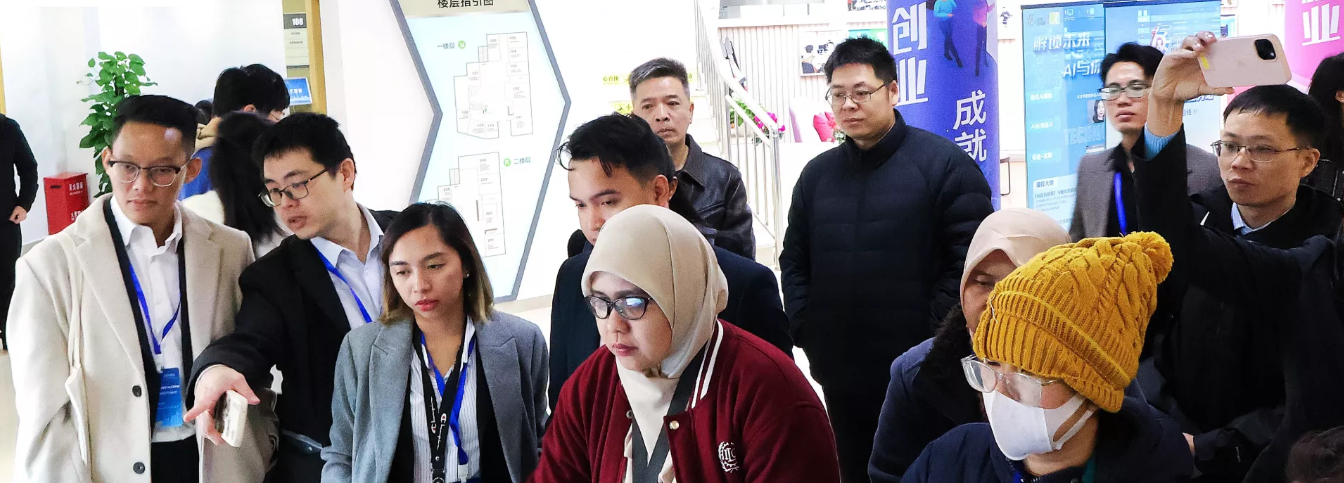South-East Asian authorities see China’s successful public employment services methods in action.
SHANGHAI (ILO News) – Public employment counsellors from across South-East Asia have picked up new skills and perspectives following a study visit to China where they had the chance to meet Chinese counterparts and learn about their good practices.
The study visit to Shanghai took place from 27–29 November 2024. It facilitated knowledge exchange between South-East Asian and Chinese officials, strengthening the capacity of employment counsellors and enhancing South-South and Triangular Cooperation.
Echoing the objectives of the ASEAN-China Year of People-to-People Exchanges, the study visit deepened cooperation and dialogue between employment counsellors in South-East Asia and China on issues such as digital transformation, the platform economy, access to employment for vulnerable groups, poverty alleviation in rural areas and entrepreneurship development.
By learning about the similarities in the opportunities and challenges among neighbouring countries in the region, representatives from participating countries can apply good practices to policy development and implementation and effective public employment services delivery.
“The study visit to public employment services in China was arranged in response to requests by government partners, looking to improve their own public employment services. Participants in this study visit gained valuable insights from China’s experiences, which not only strengthen their own public employment services system, but also support the broader objectives of the Global Development Initiative by promoting inclusive economic growth and collaboration among developing countries,” said Sheng Ling, Project Manager of the ILO Promoting the Global Development Initiative with a Focus on South-South Cooperation in Employment in ASEAN (ProSSCE-ASEAN) project.
The study visit was organized by the ILO ProSSCE-ASEAN project, in partnership with the Ministry of Human Resources and Social Security of the People’s Republic of China (MOHRSS), and brought together public employment services officials from countries across South-East Asia, including Cambodia, Indonesia, Lao People’s Democratic Republic, Malaysia, Philippines, Singapore, Thailand, and Viet Nam as well as representatives from the ASEAN Secretariat.
“It is a great honour to be here with other South-East Asian participants and Chinese policymakers. Viet Nam is in the process of making changes to its employment law so we can apply more technology into how we manage our labour market. One of the good examples is how China applies artificial intelligence and technology into labour market management, creating sustainable jobs for their people,” said Le Hong Dung, official of the Department for Social Affairs, National Assembly Office of Viet Nam.
South-East Asian representatives explored China’s effective strategies in managing public employment services at the national, provincial, district and community levels and examined ways in which good practices could be applied in their countries.
One of the highlights included the 15-minute employment service circles, which prioritize greater access and convenience to essential employment services for residents within a 15-minute vicinity. A model employment service centre that participants visited was the Puxing Road Community’s “Da Ai Le Ye Yuan” Employment Service Center which was nationally recognized as a Full Employment Community in 2017 and designated as an Advanced Employment Promotion Unit by the Shanghai municipal government in 2024.
In addition to exploring effective strategies from the public sector, participants also visited the TusStar incubation centre, recognized by Torch High Technology Industry Development Center as the first national incubator, to learn how it incubated companies to create, on average, 10,000 jobs every year. With the growing importance of the platform economy, participants also visited Meituan, a leading Chinese e-commerce platform, to see how technology can create new employment opportunities and provide insights into future employment trends.
“The public employment services study visit in China is very insightful and allows us to gain new knowledge to enhance the role of public employment services officers, especially in Indonesia. We also look forward to creating a network for public employment services officers from ASEAN countries to establish one good platform for sharing knowledge, policy initiatives, trainings and internship programmes, in order to enhance collaboration between public employment services officers in ASEAN,” said Indah Kurnia Lestari, Senior Officer of Employment Placement Service, Ministry of Manpower Indonesia (BINAPENTA).













